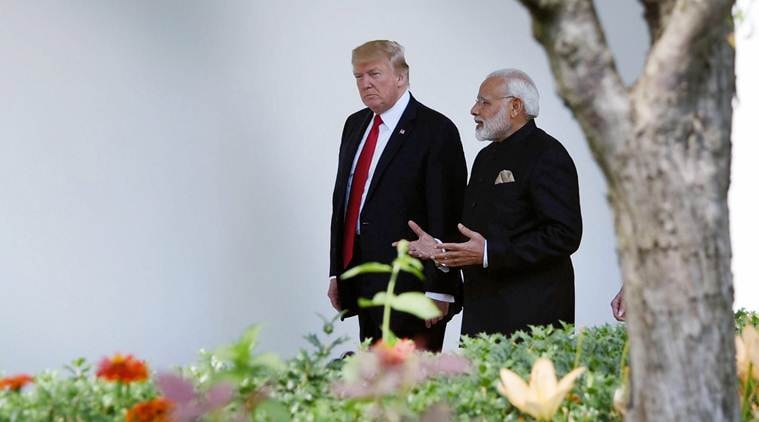
WITH DONALD Trump walking back on his threat to escalate his trade war with China, and admitting to “second thoughts”, the US has said that the President is looking forward to his meeting with Prime Minister Narendra Modi where they will “look for solutions on the trade front”.
At a breakfast meeting with the British Prime Minister Boris Johnson Sunday, Trump was asked if he was rethinking his decision to escalate tariffs against China. “Yeah, sure. Why not?” he replied. Asked again, he repeated: “Might as well. Might as well… I have second thoughts about everything.”
However, the US President said China’s approach to trade had been “outrageous”. “Presidents and administrations allowed them to get away with taking hundreds of billions of dollars out every year and putting it into China,” he said.
Trump denied that he had come under pressure from other leaders at the G-7 summit to ease up on tariffs. “Nobody’s told me that. Nobody would tell me that,” he said. But Johnson, speaking alongside him, did object, albeit politely. After congratulating Trump on “everything the American economy is achieving”, the Prime Minister said: “But just to register a faint sheeplike note of our view on the trade war: we are in favour of trade peace on the whole, and dialling it down if we can. We think that, on the whole, the UK has profited massively in the last 200 years from free trade, and that’s what we want to see… we don’t like tariffs on the whole.”
“How about the last three years?” Trump responded, laughing. “Don’t talk about the last three. Two hundred, I agree with you.” Modi will meet Johnson and Trump among other leaders. He will attend a dinner hosted by French President Emmanuel Macron at the majestic Hotel du Palais in this elegant seaside town, of less than 25,000 people on southwest France’s Basque coast, which is popular for surfing.
On-off US-China trade dispute
Donald Trump’s apparent flip-flop on China — first threatening to escalate the trade war, then saying he has “second thoughts about everything”, only for the White House to clarify that he had been “greatly misinterpreted” — underlines his discomfort with being seen as weak or wilting in the face of criticism. At a broader level, however, it reflects the back-and-forth nature of the United States’s trade confrontation with China, which has involved, in rapid succession, negotiations, threats, and announcements of high tariffs.
Ahead of the meeting on the margins of the G-7, a senior US administration official said: “President Trump is very much looking forward to his meeting with Indian Prime Minister Modi, where they will discuss the strategic partnership and how they can cooperate more closely on issues like defence cooperation, counterterrorism, and trade.”
The official said: “We expect the two leaders to build on the very productive discussions they had in Osaka at the G20, as well as the phone call that they held earlier this week. They will look for solutions on the trade front. The US is looking to India to reduce tariffs and open its markets.”
Modi and Trump had met on the sidelines of the G-20 summit in Osaka in June, when Foreign Secretary Vijay Gokhale had said that trade negotiations are not done at the level of leaders. The idea was to clear the air, and set the agenda for discussions in resolving matters. Both leaders directed officials to now move forward, Gokhale had said.
Since then, US Commerce Department officials have visited India to meet their counterparts and Commerce Minister Piyush Goyal. According to Indian government sources, the two sides can wok out the differences over “one single, long meeting”.
Later Sunday, White House Press Secretary Stephanie Grisham said the media had misinterpreted Trump’s initial remarks on having “second thoughts”. Trump doesn’t regret starting a trade war, Grisham said, but he does have second thoughts on whether he should have hit the Chinese even harder.
“The President was asked if he had ‘any second thought on escalating the trade war with China’. His answer has been greatly misinterpreted. President Trump responded in the affirmative — because he regrets not raising the tariffs higher,” Grisham said in a statement to reporters.
Trump had threatened to use national security powers to declare an emergency to force US companies to leave China, triggering accusations that it would involve abuse of presidential powers that were not intended for executive control over commercial decisions. But Trump insisted he would be within his rights.
However, sensing no unanimity on issues ranging from trade to climate change, French President Macron, who had a one-on-one lunch with Trump Saturday, decided early on that there would be no final communique.